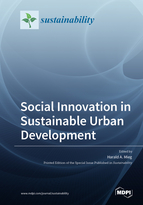Social Innovation for Sustainable Urban Developmental Transitions in Sub-Saharan Africa: Leveraging Economic Ecosystems and the Entrepreneurial State
Round 1
Reviewer 1 Report
The paper investigates a really wide argument: the African urban condition to help diagnose what kind of sustainability transition is required in the African context, and what role social innovation can play in catalyzing transition. The results is an interesting theoretical framework, recalling some macro data and theorizing quite cool hypothesis concerning sustainable development. From my perspective what is missing in this conceptual discussion is "the territory" because, especially in Africa, the heterogeneity of territorial conditions is so great that it limits the validity of any interpretative model that has ambitions of comprehensiveness. As declared by authors in the limitation: this paper also did not reflect in-depth on case studies of social innovation policies and activities in African cities that support SUD. Probably case studies could reinforce the general arguments of the research, of course changing the perspective from a continental appraisal to local analysis on social innovation opportunities or effects. I hope that in the final review the authors my highlight those critical points. I give minor revision because the structure of the work is well organized, full of relevant references, the logic of the discussion is robust, but I am not satisfied from the excessive generalization proposed by authors. I hope thatAuthor Response
Please see that attachment.
Author Response File: ![]() Author Response.docx
Author Response.docx
Reviewer 2 Report
The article discusses in a very general manner the issue of the entrepreneurial state and economic ecosystems and their impact on the issues of spatial planning and cities. There is a noticeable lack of appeal to the so-called positive. key sudies, on the basis of more detailed and objective conclusions, supported by the examples discussed above, could be drawn.
Best regards
Reviewer
Author Response
Please see the attachment.
Author Response File: ![]() Author Response.docx
Author Response.docx





